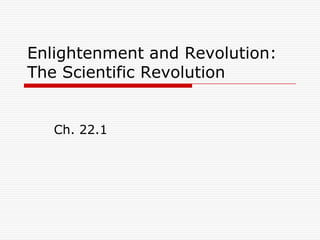
Ch 22.1 the scientific revolution
- 1. Enlightenment and Revolution: The Scientific Revolution Ch. 22.1
- 2. The Roots of Modern Science Renaissance inspired curiosity This led to the Reformation The Reformation and the challenge to authority, helped start the Scientific Revolution.
- 3. Science: The Medieval View Remember the Earth- at-the-center-of-the- Universe theory? Aristotle, the greatest scientist until the 1500’s, had supported this idea. After all, it seemed logical. The Sun moves and we don’t.
- 4. A New Way of Thinking Scientific Revolution: Beginning in the mid 1500’s, new scientific ideas would be based upon careful observation. A willingness to question accepted beliefs Newfound manuscripts launched new ideas European exploration fueled scientific research. Used stars to guide ships Needed better instruments and geographic measurements. When they started looking around, they found their observations did not match the ancient beliefs.
- 5. Geocentric vs. Heliocentric Geo=Earth Helio= Sun Centric=Center Nicolaus Copernicus first started the concept. However, his theory could not perfectly explain why the planets behaved the way they did. Johannes Kepler’s mathematic laws showed the planets moved in elliptical patterns, not circular, like proposed by Copernicus.
- 6. Aristotle vs. Galileo Aristotle Galileo Believed a pendulum Showed a pendulum slowed down as it does not slow down. approached its Called the Law of the resting place Pendulum Believed heavier Showed that all objects fell faster objects fall at the than smaller ones same speed. Earth was center of With a homemade universe telescope, monitored the movement of the stars to show the Sun was the center of the universe
- 7. Conflict with the Church Galileo was urged by the church not to pursue his ideas about the universe He did anyway, in a book called Dialogue Concerning the Two Chief World Systems Was threatened by the Church and forced to deny is ideas he knew to be true Sentenced to house arrest for the rest of his life. Later, the Church issued an apology to Galileo, saying they were wrong to suppress his scientific findings. IN 1992!!!!!
- 8. The Scientific Method Find a problem Form a hypothesis (prediction) about that problem Observe the problem through experimentation or data collection See if observation proves or disproves the hypothesis Repeat process many times
- 9. Observation vs. Assumption What we see or believe isn’t always what is going on. “I’d help someone who was in trouble” “Eyewitness accounts are reliable” “I’d never hurt another human just because someone told me to”
- 10. Some Revolutionaries Francis Bacon English politician and writer Believed science could improve people’s lives Criticized peoples acceptance of Aristotle’s ideas Rene Descartes Rejected old assumptions and teachings Accept only things learned through observation Knew only one thing for certain: “I think, therefore I am.” Moved on from there.
- 11. Isaac Newton Brought together the ideas of Copernicus, Kepler, and Galileo under one unifying theory. The Theory of Motion All things are affected by a force, gravity That force ruled the planets, pendulum, and all matter on Earth and Space Every object attracts every other object. The degree of attraction depends on the mass of that object and the distance between the objects. His book Mathematical Principles of Natural Philosophy, described the universe as a giant clock. All its parts worked together perfectly in ways that could be described by mathematics. Believed God was the creator of this orderly universe, the clockmaker who had set everything in motion
- 12. The Revolution Spreads Zacharias Jannsen: 1st microscope Anton van Leeuwenhoek: Observed bacteria under a microscope Proved tiny organisms did not just spontaneously appear, as previously thought Evangelista Torricelli 1st mercury barometer Gabriel Fahrenheit and Anders Celsius The mercury thermometer, and their respective measurements
- 13. Andreas Vesalius Dissected cadavers to get a better understanding of the inner human body. William Harvey The Heart and Blood Vessels Edward Jenner Vaccine for smallpox using cowpox vs. smallpox Robert Boyle The founder of modern chemistry